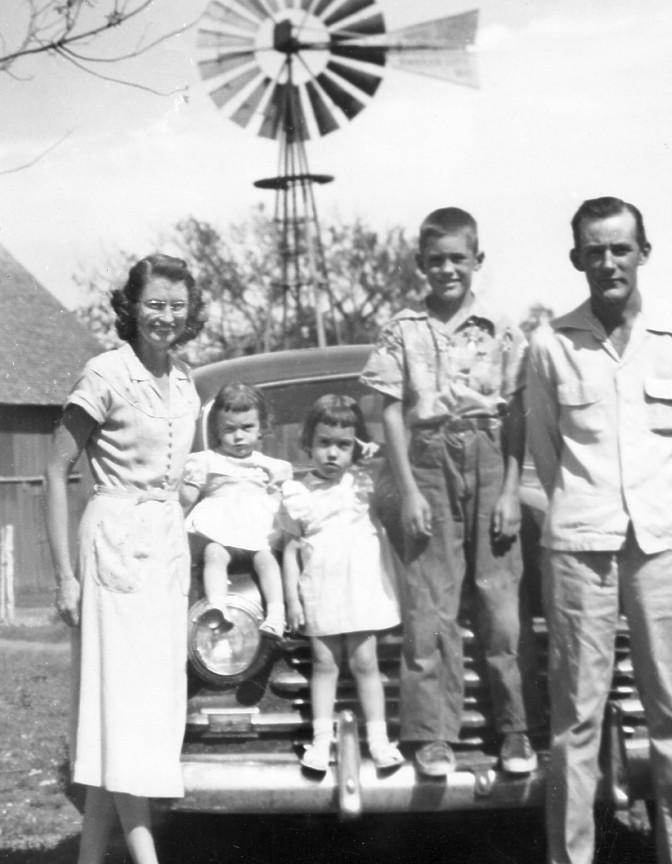Kansas Snapshots by Gloria Freeland - May 15, 2020
Bringing along our past
For more than 30 years, husband Art and I ate out frequently. So when restaurants were recently closed, I expected it would be a
difficult adjustment. But it hasnít been.
I have wondered if this is because we grew up when going to a restaurant was a rare event. Art was about 8 the first time he went
out to eat. That detail sticks with him because, like starting a new school or learning to ride a bike, it had never happened before.
I lived on a farm and my meals were almost always at home or in the school lunch room.
Art's interest in science kept him in his basement at home from an early age. He recalls that his life was virtually unchanged when
youngsters were quarantined to their yards during a 1950s polio epidemic. So self isolation has been a snap for him. I had two
siblings close to my age, so I have missed the human interaction more. Still, farm kids grow up making their own entertainment.
Part of that "entertainment" included planting and tending gardens. The fact that Art and I have traveled extensively during the
spring and summer in recent years has dampened that urge. But with current travel restrictions, the desire to plant something -
anything! - is again emerging. I now better understand why, year after year, mom ordered dozens of bulbs even into her late 80s.
It was something she had always done ... it was part of her.
A recent letter to the editor in the local newspaper illustrates how one woman, who grew up during World War II, feels about the
COVID-19 situation.
... You don't even know what having your freedom limited is like! You never would have made it thru World War II! At that time, we
had been invaded by an enemy, and we temporarily gave up a lot of our "rights" in order to not lose them permanently. That
"temporarily" lasted four years not just weeks or months like you are whining about! But we did it because we felt it was our duty
to help save our fellow countrymen ... We didn't just have limits on recreational activities, work and other events. We had them on
everything from sugar to tires to gasoline to makeup to women's hose and much more. Every family was issued a ration book with stamps
good for a certain amount of each rationed product. If you used all your stamps before you were due to get a new book, tough, you
did without! ... Remember, we had no TV or video games or cell phones to entertain us the numerous days, months and years that our
activities were limited ...
For this woman, who experienced limits as a youngster, the current situation is not difficult.
My parents were also of that generation. They were accustomed to "scrimping and saving" through the Great Depression and enduring
the Dust Bowl days and World War II. Those experiences could later be called upon to help them through challenging times.
My training as a reporter and employment at various newspapers made the inverted-pyramid style of writing my go-to approach in telling
a story. Core elements of any tale were clustered in the first few paragraphs, followed by items of declining importance in later
ones. This approach allows an editor to cut the story to fit the space available, while still retaining the most important aspects.
Another rule was that my personal views were to be eliminated. The gold standard is being accurate, informative and, if possible,
engaging.
But columns are different. The writer's point-of-view is paramount and the piece is to be published in its entirety. While the purpose
may be to inform, columns may also be educational, persuasive or just entertaining. The subject matter is frequently current events,
but historical and even personal topics are also fair game.
As an introvert, I was comfortable being the reporter "fly on the wall" who told just what I had observed. But when I became a columnist,
I would be front and center. "Snapshots" first appeared in the weekly Riley Countian. Around the third column, Art asked to read it
before I submitted it. I balked. He asked why. I answered he might see a mistake and that would be embarrassing.
I barely got the words out when I realized how ridiculous that was. But before I could take them back, he replied, "So let me get this
straight. If I read it and find an error, that will be embarrassing, but if hundreds of your neighbors all over the county see that
same mistake, thatís no problem?"
Today, Art is always my "first reader" and this has provided me a freedom I otherwise wouldnít have. Whereas I once fretted over
whether some topic was column-worthy, today I often just write it, hand it to him and ask, "Is this anything?"
I think experience such as these are common. We move on, yet bring along bits and pieces of past experiences. I am now comfortable
writing my column, yet can effortlessly switch back to being that reporter when the need arises. Our newspaper-letter writer does not
face the restrictions of the pandemic with the angst that many of her younger neighbors do.
We know physical characteristics - the way we're built, our eye and hair color, the tendency to have heart problems or live to an
advanced age - come from our genetic legacy. But sometimes we forget that what we did as children, what we learned and what we watched
our parents do, also follow us through life. We may think of traumatic events from the past as things that hold us back, yet other
experiences are equally likely to be helpful. Just as with our genes, our past circumstances may hinder us as we go forward, but
they also hold the potential to help us adjust and adapt.
